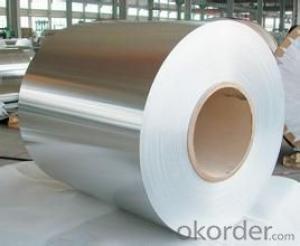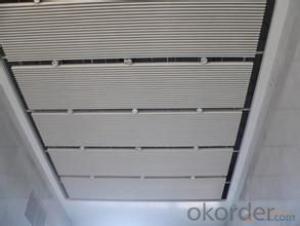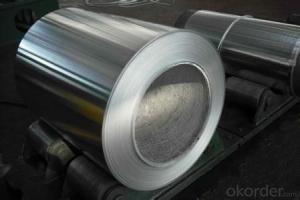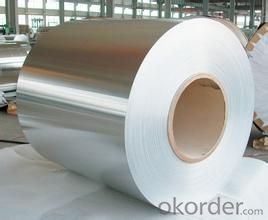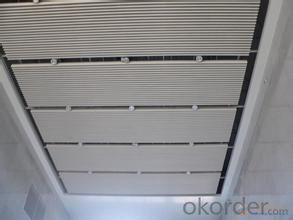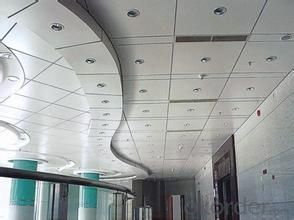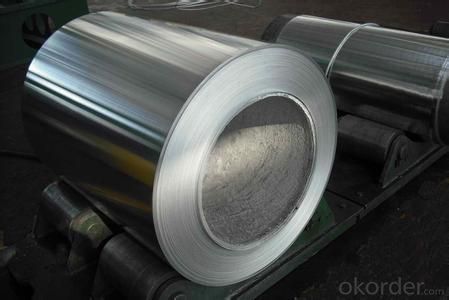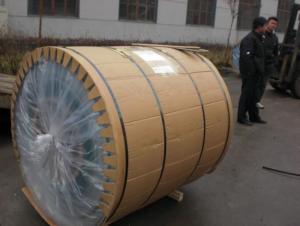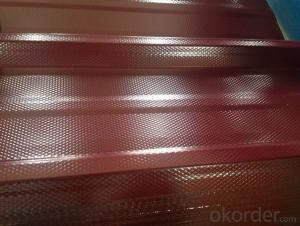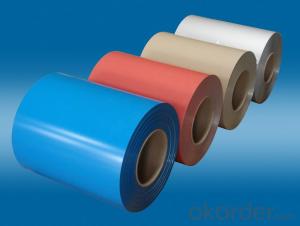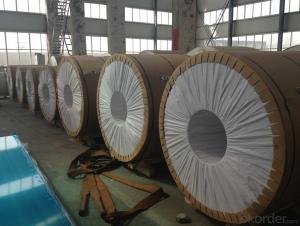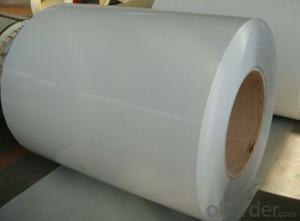Thin Aluminum Coil for Roofing
- Loading Port:
- China Main Port
- Payment Terms:
- TT OR LC
- Min Order Qty:
- -
- Supply Capability:
- -
OKorder Service Pledge
OKorder Financial Service
You Might Also Like
Aluminium is a relatively soft, durable, lightweight, ductileand malleablemetalwith appearance ranging from silvery to dull gray, depending on the surfaceroughness. It is nonmagnetic and does not easily ignite. A fresh film ofaluminium serves as a good reflector (approximately 92%) of visible lightand an excellent reflector (as much as 98%) of medium and far infraredradiation. The yield strength of pure aluminium is 7–11 MPa,while aluminium alloys have yield strengths ranging from200 MPa to 600 MPa. Aluminium has about one-third the densityand stiffness of steel. It is easily machined,cast, drawn and extruded.
Aluminium alloys (or aluminum alloys; see spellingdifferences) are alloysin which aluminium(Al) is the predominant metal. The typical alloying elements are copper, magnesium,manganese,silicon,tin and zinc. There are twoprincipal classifications, namely casting alloys and wrought alloys, both of which are furthersubdivided into the categories heat-treatableand non-heat-treatable. About 85% of aluminium is used for wrought products,for example rolled plate, foils and extrusions.Cast aluminium alloys yield cost-effective products due to the low meltingpoint, although they generally have lower tensile strengthsthan wrought alloys. The most important cast aluminium alloy system is Al–Si,where the high levels of silicon (4.0–13%) contribute to give good castingcharacteristics. Aluminium alloys are widely used in engineering structures andcomponents where light weight or corrosion resistance is required
Specification:
Alloy: AA1050, 1060, 1100,AA3003, 3005, 3015, 5052, 5754, 5083,8011, etc
Temper:H14/16/18/22/24/32, HO etc.
Thickness:0.2mm—100mm
Width: 100mm—2300mm (Can be slitted)
InnerDiameter: 508MM
Coil Weight:500kg-3000kg(Max.)
Application:Foil stock, Circles, Roofing, Can stock, Marine plate,Anti-slipery purpose in vehicles, packing and appliance.
Features:
1. Excellent quality of products
2. Quick delivery
3. Best service to clients
4. BV,SGS avalible
5. No buckle o waveness
6. Tension leveling
7. Certificate of Origin
8. Form A,E
Packaging Detail:
Carton ,Woodenpallet with plastic protection packing ,standard seaworthy packing or as yourrequest.
ProductionCapacity:
AnnualProduction capacity of 600,000 tons.
Products areexported to United States, Canada, U.A.E, Brazil, Mexico,Thailand, Vietnam,Nigeria etc, over 100 countries andregions all over the world.
Production Line:
CNBM aluminumproduction base is comprised of 18 aluminumannealers, 10 coil and foilmills, 4 continuous production lines, 2hot rolling production line and 3prepainted lines.
FAQ:
1. What is the form of payment?
Normally 30% TT, L/C
2. Type of quotation?
FOB, CFR, CIF
3. Port of loading?
Shanghai port
4. Delivery time?
30 day after client’s deposit
- Q: What are the production processes of aluminum coil and what are the functions of various industrial furnaces in the production of aluminum? The more detailed, the better. Thank you! Points!
- There are aluminum annealing furnace, aluminum alloy quenching furnace, aging furnace and smelting furnace.
- Q: Can we provide raw materials, aluminium coils and aluminum panels for several integrated ceilings?
- You go to my space, add my QQ bar, I do aluminum, aluminum coil, aluminum wafer, and I also want to know about the requirements of integrated ceiling ~ ha ha!
- Q: i need ONE advantage of each, and a final reason why aluminium is used?
- Copper and Aluminum are both great conductors of electricity. Aluminum is actually more dangerous than copper, as it expands/contracts a lot more with heat, and is a primary cause of house fires. Copper's advantage is that it is more reliable, it doesn't corrode as easily, and does not expand/contract much with application of heat. I believe that aluminum has an edge as a conductor, though, and is less expensive to manufacture.
- Q: How long do aluminum coils last?
- The longevity of aluminum coils can differ based on various factors including maintenance, usage, and environmental conditions. On average, aluminum coils that are well-maintained can endure for approximately 15 to 20 years. Nevertheless, with appropriate care and consistent cleaning, certain aluminum coils have been reported to endure even longer, reaching up to 30 years or beyond. It is crucial to emphasize that regular upkeep, such as coil cleaning, inspection for damage or corrosion, and ensuring proper airflow, can greatly increase the lifespan of aluminum coils. Furthermore, elements like exposure to severe weather conditions, levels of humidity, and the quality of installation can also have an impact on the durability of aluminum coils.
- Q: Can aluminum coils be used in solar energy systems?
- Yes, aluminum coils can be used in solar energy systems. Aluminum is a commonly used material in the construction of solar panels and solar energy systems due to its excellent properties. Aluminum coils are lightweight, durable, and have excellent thermal conductivity, making them ideal for transferring heat away from the solar cells. Additionally, aluminum is resistant to corrosion, which is crucial for outdoor applications where solar panels are exposed to various weather conditions. The use of aluminum coils in solar energy systems helps improve the overall efficiency and lifespan of the panels, contributing to the effectiveness and sustainability of solar energy generation.
- Q: What are the different pre-treatment methods for aluminum coils?
- Some of the different pre-treatment methods for aluminum coils include cleaning, degreasing, etching, and phosphating. Cleaning removes dirt, dust, and other impurities from the surface of the coil. Degreasing eliminates oils and greases that may be present. Etching creates a rough surface on the aluminum, which helps in improving adhesion for subsequent coatings. Phosphating involves applying a phosphate coating to enhance corrosion resistance and improve paint adhesion. These pre-treatment methods ensure that the aluminum coils are properly prepared before any further processing or coating.
- Q: Is it possible to utilize aluminum coils in the manufacturing process of solar panels?
- <p>Yes, aluminum coils can be used in the production of solar panels. Aluminum is a common material used in solar panel frames due to its lightweight, high strength, and excellent heat dissipation properties. It also offers good resistance to corrosion, which is crucial for outdoor applications. Aluminum coils are often chosen for their ease of manufacturing and cost-effectiveness, making them a suitable choice for constructing the frame or support structure of solar panels.</p>
- Q: Is it possible to utilize a grinder for cutting aluminum coils?
- <p>Yes, you can use a grinder to cut aluminum coils, but it's important to use the right type of grinder and accessories. An angle grinder with a cutting wheel or a metal cutting disc is suitable for this task. Ensure the grinder is equipped with a safety guard and that you're wearing appropriate safety gear, such as goggles and gloves. Be cautious as aluminum can be slippery and the grinder can generate a lot of heat, which may require frequent cooling to prevent the disc from burning out. It's also advisable to work in a well-ventilated area due to the fine particles produced during cutting.</p>
- Q: What are the different types of aluminum coils?
- There are several different types of aluminum coils available, each with its own unique properties and uses. Some common types include: 1. Plain Aluminum Coils: These coils are typically made from pure aluminum and are used in a variety of applications, including packaging, construction, and automotive industries. 2. Embossed Aluminum Coils: These coils have a textured or patterned surface, which adds aesthetic appeal and can enhance the grip or provide anti-slip properties. They are commonly used in architectural designs, signage, and decorative applications. 3. Color Coated Aluminum Coils: These coils have a protective coating applied to the surface, providing enhanced durability, weather resistance, and aesthetic customization. They are often used in building facades, roofing, and cladding systems. 4. Anodized Aluminum Coils: Anodization is an electrochemical process that forms a layer of oxide on the surface of the aluminum, making it more resistant to corrosion and wear. Anodized aluminum coils are commonly used in architectural applications, electronics, and automotive parts. 5. Pre-painted Aluminum Coils: These coils have a layer of paint applied to the surface, providing protection against weathering and adding color aesthetics. They are frequently used in the construction industry for roofing, siding, and insulation purposes. 6. Stucco Embossed Aluminum Coils: These coils have a raised pattern resembling stucco, which adds texture and enhances the strength of the aluminum. They are commonly used in refrigerators, air conditioners, and other appliances. 7. Clad Aluminum Coils: Clad aluminum coils consist of two or more layers of aluminum bonded together for enhanced strength, durability, or specific properties. They are used in various industries, such as aerospace, defense, and transportation. Overall, the choice of aluminum coil type depends on the specific application requirements, such as desired appearance, corrosion resistance, durability, and mechanical properties.
- Q: How do aluminum coils contribute to reduced carbon emissions?
- Aluminum coils contribute to reduced carbon emissions primarily due to their lightweight nature and recyclability. As aluminum is significantly lighter than other metals, such as steel, it reduces the overall weight of vehicles and machinery, subsequently improving fuel efficiency and reducing carbon emissions. Additionally, aluminum coils can be easily recycled, requiring much less energy compared to primary aluminum production, which results in lower greenhouse gas emissions.
Send your message to us
Thin Aluminum Coil for Roofing
- Loading Port:
- China Main Port
- Payment Terms:
- TT OR LC
- Min Order Qty:
- -
- Supply Capability:
- -
OKorder Service Pledge
OKorder Financial Service
Similar products
Hot products
Hot Searches
Related keywords
